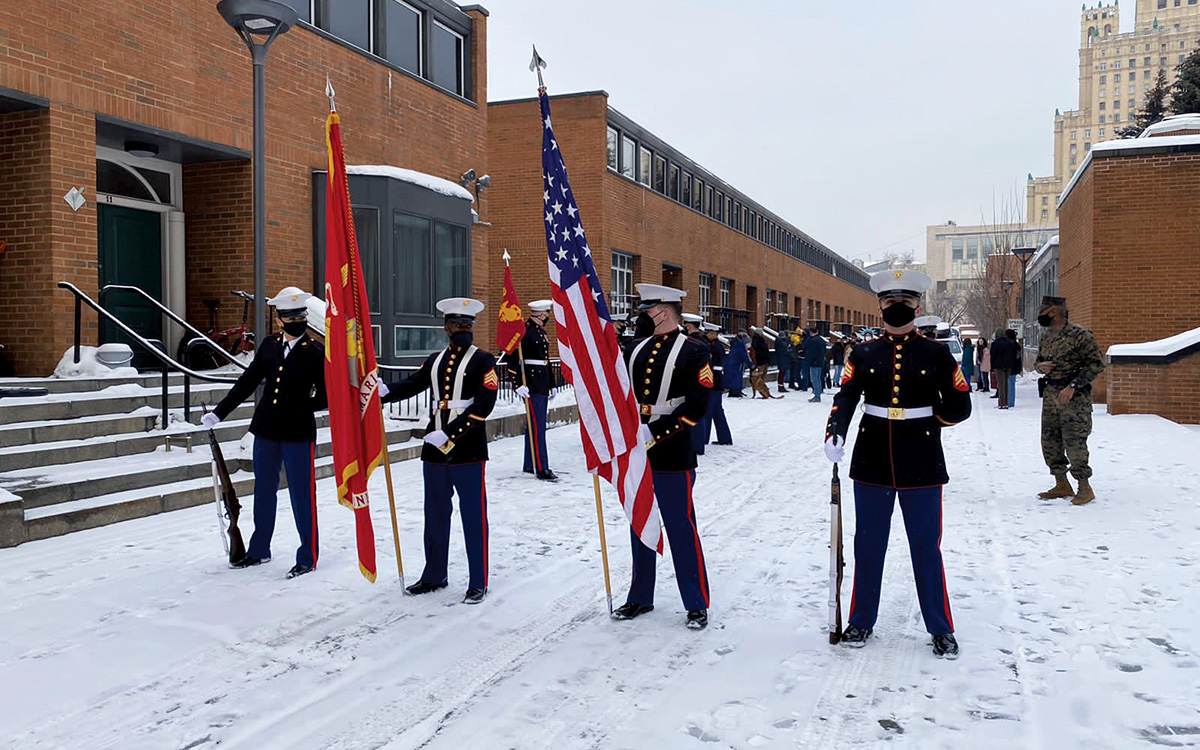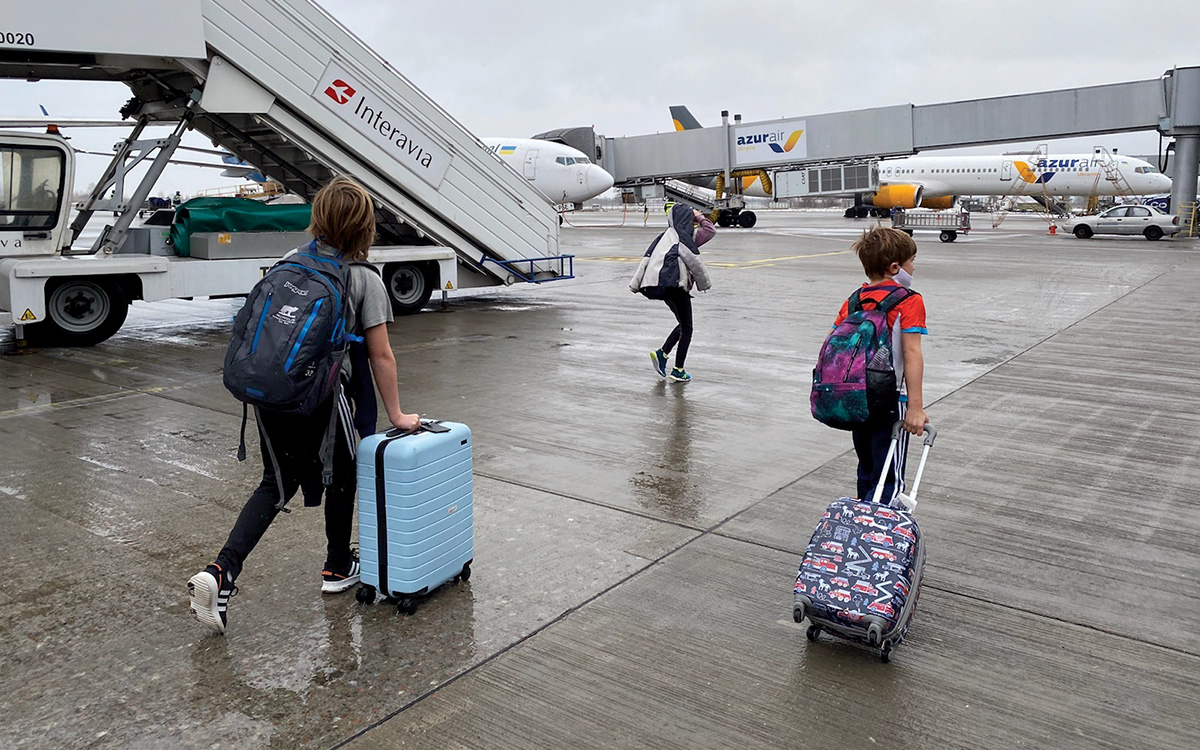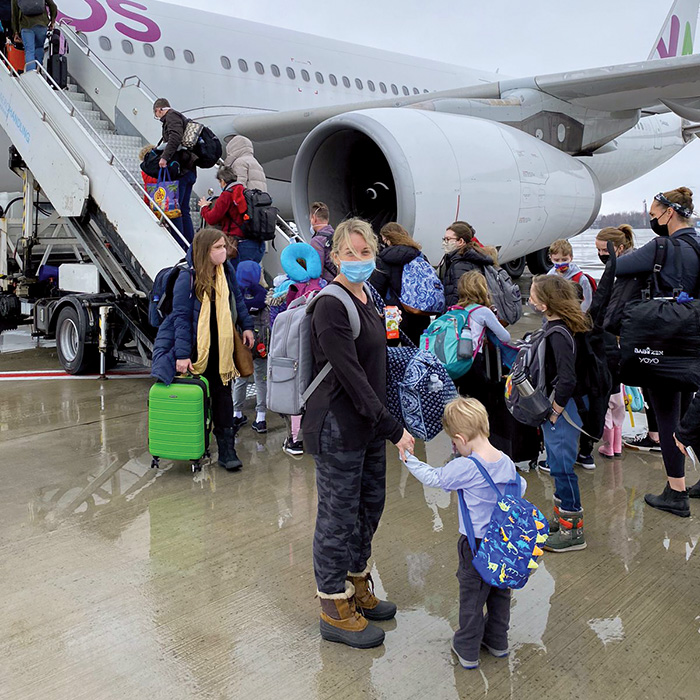What to Expect When You’re … Evacuating
Nobody wants to do it. But there’s a good chance it’ll happen to you. Here’s what you need to know.
BY DONNA SCARAMASTRA GORMAN

A farewell parade at U.S. Embassy Moscow for the Gormans, who were declared persona non grata in December 2021.
Courtesy of Donna Gorman
It wasn’t really a surprise when it happened. People have been getting expelled left and right from Moscow for the past few years, after all. Still, when we got the diplomatic notice telling us we had a little over a week to get out of the country, the stress hormones kicked in as we swung into action.
Over the course of a 24-year career, we’ve had to leave in a hurry three times. We were expelled from our first post, Moscow, in 2001. While at our third post, Kazakhstan, we left for a medevac and never returned. And now this—our second expulsion from Moscow. You could say we’re something of experts by now.
For my friend Jessica Hayden, however, this was the first evacuation in a nearly 20-year career. She was on the other side of the Russian invasion, in Kyiv, with three kids and a puppy who had to get out in a hurry while her spouse stayed behind.
The two of us met up for coffee in Arlington (okay, there are some good sides to a sudden evacuation) and mapped out what you need to know if—when—this happens to you.
“We knew it was coming …”
“Try to have a plan,” says retired Diplomatic Security Agent John Rendeiro, now a senior adviser at SOS International, which handled more than 1,000 air ambulance evacuations in 2021, along with several thousand more “accompanied evacuations,” where patients were able to fly commercial airlines, usually with a nurse in tow. “Think about it ahead of time. Do you have family, friends, a certain area you could go back to?”
It usually happens more quickly than you’d expect. “Even in Ukraine, it wasn’t sudden, or it shouldn’t have been,” says Rendeiro. “We knew it was coming, but many people doubted anything would happen, so it was still a sudden departure for them.”
Evacuations can be triggered by war, civil unrest, local criminal violence or natural disasters. As of mid-April 2022, five major posts were on ordered departure, authorized departure or suspended operations status. Even at the calmest post, you could face a personal medical crisis and have to leave post within a few hours or days. It pays to prepare, no matter how sleepy your post might seem.

The Hayden children make their way to their flight out of Ukraine in late January.
Courtesy of Jessica Hayden
The Go Bag

Loren Braunohler and son Quinn wait to board the evacuation flight out of Kyiv in January.
Courtesy of Loren Braunohler
Everyone knows you need to have a “go bag,” but what does that actually mean?
Laura Gehrenbeck, an FS family member who evacuated from Kyiv ahead of the Russian invasion this year, says her FSO husband David, who stayed behind, made sure they each had copies of all identification documents, COVID-19 vaccine records, banking data, tax forms, school papers, credit card numbers and the family’s entire “encyclopedia of passwords.”
“The go bag thing is real,” says Gehrenbeck, but “don’t get too bogged down by lists. Focus on documents/passwords/crucial information (making sure there is a set for each person if you are a couple) and medicines.”
If you have children, you’ll want electronic copies of school and vaccination records stored in the cloud. Consider scanning and saving any notes or artwork they’ve made, as well. As Jessica and I sit together in Arlington, she’s less upset about the car and other expensive items she may never see again, but she is devastated by the loss of her kids’ artwork.
Juliet Johnson, an FS family member who also recently evacuated from Kyiv, has thought about special things she wishes she’d packed when she left. If she could go back in time, she commented, she would have been more intentional about packing the things that are irreplaceable and hold sentimental value. “We put skis and soccer gear in our UAB [unaccompanied air baggage], which is all just replaceable stuff. But our kids’ bottle cap collection with caps from our posts like Tokyo and Malawi, the handmade bowl we bought in Cordoba, and the potholders my nieces wove are sitting in our apartment in Kyiv. I wish we had put more of our treasures in our luggage.”
If you have a pet, it’s essential to ensure their vaccine records are up to date and accessible. It’s a good idea to research vets and boarding facilities as soon as you touch down at a new post, in case your pet can’t travel on the same flight as you. Moreover, consider not only the rules and regulations for importing/exporting a pet into the United States, but also what is required to transit a pet through the European Union. In Moscow, when the war talk started building, the local veterinarian began making house calls to update rabies vaccines and start travel paperwork. When the invasion began and flights out of country ended, colleagues with pets were forced to drive to the Finnish border to get their dogs out of Russia.
Plan and Purge
When I was medevaced from Kazakhstan in 2004 after our baby got sick, we had no idea it would be forever. We were midway through our assignment, with all the overflowing junk drawers that typically entails. Despite the fact that we’d been expelled from another country—Russia—in 2001, we weren’t prepared for a quick exit from post. Packout was a disaster, as my spouse had to manage it alone, while trying to close out his work at post, find a new assignment in D.C. and talk to his stressed-out wife, who was alone with the baby at Children’s Hospital. We were overweight, with no time to do anything other than jettison whole boxes without even checking their contents. We learned the hard way about itemizing valuables with the insurance company and photographing everything you own. This time, when we saw what might be coming, we spent our winter vacation purging the house in advance.
While at post, periodically go through your belongings. Donate or toss the things you don’t need. Shred, scan or file the papers piled on the kitchen counter. Make sure the passports and COVID-19 vaccine cards get put away properly after every trip. And while you’re at it, check that your passports and driver’s licenses are still valid.
Evacuations can be triggered by war, civil unrest, local criminal violence or natural disasters.
Laura Gehrenbeck says her family had many dinner table conversations about what to bring if they had to leave Kyiv, but “I was convinced at the time that we would be returning in 30 days and really didn’t give the sentimental items due consideration. I dismissively flapped my hands declaring, ‘It’s all just stuff!’” Her husband was more thoughtful about the process, removing pages from the wedding album, grabbing a poem written by their daughter for Laura’s birthday from the wall, and tucking away her grandmother’s ring. He even, she says, “arranged with a friend to put a quilt I had made for his 50th birthday into their air freight. He was our hero of family memory preservation.”
When the consulate and her own residence in Nuevo Laredo were attacked in March 2022, consular officer Elizabeth Baiocchi had an hour to pack up and get out with her 3-year-old daughter. She spent the night with a friend before leaving post the next day. She now faces a remote packout, with help from colleagues still at post, and she says she wishes she had “organized the important papers better and donated some things I had been meaning to get rid of.” She also advises others to “set aside emergency funds, as there are lodging, transportation and clothing expenses that may never be fully reimbursed.”
Identify family and friend helpers or potential hosts, says a Kyiv evacuee, “and have conversations with them about being part of your ‘just-in-case’ team.”
Have U.S. dollars and a working credit card on hand, and consider keeping a U.S. SIM card active so you can text family and access the internet as soon as you land in the States.
The Need for Good, Timely Information
Your Evacuation Checklist
There are many resources on the Global Community Liaison Office crisis management webpage at bit.ly/GCLOCrisisManagement.
You’ll find a detailed list of what to pack in your go bag, including which documents, medical supplies and personal items you will need at bit.ly/GCLOGoBag.
Important papers don’t just include passports: you’ll want school records, employment records, naturalization papers, birth and marriage certificates, and more (see bit.ly/GCLOImportantDocs). Take the time now to scan these documents and store them on a thumb drive or in the cloud. Consider leaving an extra thumb drive with a trusted relative back home.
For help developing a family emergency plan, go to www.ready.gov.
At post, get to know your RSO staff and attend their briefings so you know what’s being planned in an emergency. Take drills and radio checks seriously.
If you’re the employee, don’t assume your family has the information they need. Make sure they know what is happening, and ensure they are on all post communication lists.
Get ready before you need to: shred, donate and recycle everything you don’t need. Photograph your valuables—including serial numbers for electronics.
—D.S.G.
When it comes to evacuations, says one anonymous Foreign Service specialist: “Nothing is centralized. You’d think it would be. But it all depends on the RSO [regional security officer] and the front office. It becomes a leadership thing at post—did they plan for this or not?”
One spouse in Kyiv said: “The lack of good information shared with the community prior to the drawdown was a real stressor, and those whispers and rumblings among us only served to ratchet up the tension. That is a fact of an evacuation—you are not going to get good information when you want it. This will frustrate you and maybe make you angry. Please don’t direct that anger at people who are working to help everyone through the situation.”
Be prepared to be your own advocate. You may need to purchase your own plane tickets to leave post. You may need to get yourself and your family to the airport or drive across borders. You may need to figure out the bureaucracy of exporting a pet in a foreign language on your own. Although there are always things you can do to be better prepared, each departure will look and feel different—and there is never a way to be fully prepared. Flexibility and the knowledge (and acceptance) that you can’t control how the path will unfold may be your best tools.
“There were a lot of people who were not happy with the way things were communicated/handled,” an FSO assigned to Kyiv said of the recent evacuation. They felt their boss did a good job sharing information, but acknowledged that not everyone may have thought so. “I don’t have EFMs to update,” the FSO said, “but as we’ve seen on Trailing Houses [Facebook group], communicating honestly to spouses is not something at which all direct hires excel.” Make sure your family members have the information they need to make decisions.
A family member who left Kyiv said that in the days before the evacuation was ordered, there was “a lot of pointing fingers and bad-mouthing,” which she believed could have been avoided with better, more direct information. While nobody knew for sure what would happen, she says, telling people “what Plan A may look like” might have helped. “I would rather be told to plan accordingly for worst-case scenarios,” she says, even if they never happen.
Your New Normal

Pages from their wedding album that Laura Gehrenbeck’s husband preserved during the evacuation from Ukraine.
Courtesy of Laura Gehrenbeck
“Getting your body to safety is one thing. It may take time for the rest of you to catch up,” says Gehrenbeck. “There will be a lot of feelings washing over you. The strongest of them may be guilt. I’m still trying to figure out what to do with that one.”
Survivor’s guilt is real. Expect to worry about the people you left behind and the work you left undone.
Find a support network of fellow evacuees—easily done when it’s a large-scale evacuation, not so easy if it’s a personal crisis like a medevac. If you’re evacuating as a group, consider sticking together at the same hotel; it’ll help when you need a shoulder to cry on or an emergency babysitter. Many families evacuating from Kyiv opted to move to Falls Church, Virginia, and enroll their children in the local school to maintain continuity.
Loren Braunohler, a former Foreign Service officer and Kyiv evacuee, explains: “The bond you first created at post will only grow stronger as you go through the trauma of leaving a place, its people, and your home and belongings so quickly and unexpectedly. That bond will grow even stronger as you start anew together in a new place with new schools, develop new routines and figure out a new temporary.”
As the situation in Kyiv deteriorated, Braunohler and her fellow evacuees in Falls Church relied on each other during the darkest days. “You have each other to lean on, grieve with, and figure out how best to get through the tough times together,” she says. “At this point, your bond will be forever forged, and that is the silver lining of this whole chaotic experience.”
It’s an emotional train ride, says another Kyiv evacuee. We’re “processing feelings of guilt and shame for occasionally wishing we had our comfort items while all this suffering is going on,” she says, and friends, neighbors and local colleagues are exposed to real violence and family separation.
Those who aren’t directly affected by an evacuation have a significant role to play in supporting colleagues. “Ask us how we are,” says one current evacuee, “and be prepared for whatever answer we give. Not every day feels like an ‘Oh, I’m fine, thanks, how are you?’ kind of day. Acknowledge that we’ve lost a lot. Yes, we have access to insurance and have our jobs, our livelihoods ... but many of us left with two bags and a carry-on.” Offer to babysit. Fire up your DoorDash account, and have a meal delivered. Make plans to take new arrivals to the grocery store.
Know that you will get through this, and eventually the stress of the hurried departure will fade into the past as you move into the next phase: hitting refresh on your newsfeed while waiting for the departure order to be lifted, or curtailing and finding a new assignment if it isn’t.
“I wish I’d had more scope of imagination for the impossible to happen,” says Gehrenbeck. “Because that’s what is happening. And I just couldn’t fit it in my head that Russia would lob missiles, send tanks and earnestly invade Ukraine. Twenty-three years into this gig, and this is our first evacuation. Luckily, those years have helped me to distill and refine what ‘stuff’ means to me, what home means to me, what to plan for and what not to worry about. Even with that perspective, we are still reeling. But we are safe, and for that we are grateful.”
What We Left Behind
My husband is standing in the departures lounge at Kyiv International Airport. The day is Jan. 29, 2022. Our three children are standing close to him. They are all wearing masks that obscure their beautiful faces. We’ve just battled long check-in lines with frazzled airport staff who are struggling to keep up with the frantic pace and demands as too many people try to leave Kyiv on too few flights. In several weeks, this airport will be empty, the sky closed to commercial flights. But right now, it’s a mélange of sweat and panic and exhaustion. And it is also where we are saying goodbye to my husband, who will stay behind.
I snapped a photograph in these last minutes when we were still together, our family of five. I snapped a photograph because that’s what we do as mothers. We capture the little moments that will later be memorialized in our photo albums and on our digital frames. Shared with grandmothers and aunts and uncles. And yet today the act of capturing this moment is discordant. This was not a holiday card or an exotic family vacation.
I snapped a photograph in these last minutes when we were still together, our family of five.
This was hard. This was pain and uncertainty and grief. This was a rupture in all that we had known. Our 12-year-old son stands next to his father with his head pressed against his chest as he sobs. He knows. He knows what lies ahead is filled with sorrow. His eyes are painted with pain. Our younger kids are aloof. Still focused on childhood concerns like the next snack and getting a window seat.
Months into this evacuation and this war, I often think about that photograph. I think about that moment when we had the privilege to leave before our neighborhood was shelled. I think about how little we knew about the horrors that would befall this city we came to love. How little we knew about the sleepless nights and unanswered questions that were yet to be asked. How little we knew about how strong we would need to be. For ourselves. For our families. For Ukraine.
—Jessica Hayden
Read More...
- “Educational Preparedness: When an Evacuation Disrupts School,” by Marybeth Hunter, Cecile Mines and Courtney Colbert, The Foreign Service Journal, December 2017
- “When Lightning Struck Twice: Drawing Down Mission Russia,” by Michael A. Lally, The Foreign Service Journal, March 2020
- “Post Evacuation,” U.S. State Department Global Community Liaison Office





